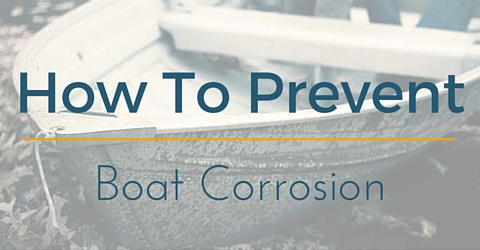In 2015, more than 44,400 aluminium boats and pontoons were sold, making them the third-highest selling category of boats for the year. It’s no wonder they are so popular as they are extremely light yet durable, increasing their speed on the water and ability to transport via trailer. Although aluminium boats are corrosion resistant, they are not corrosion proof, especially if a low-grade aluminium is used. Luckily, there are a variety of ways to prevent and protect your boat from the effects of oxidation and corrosion.

Oxidation and corrosion are very similar, and the biggest difference is the medium that causes the chemical reaction. Oxidation is where electrons are drawn away by free oxygen molecules and corrosion is where a material comes into contact with a liquid or dissimilar metal causing a galvanic reaction. In layman’s terms, oxidation is caused by oxygen where corrosion is a chemical reaction to other metals or liquid.
Although galvanic corrosion is more prevalent when boating in salt water, boats in fresh water are not immune. Because salt water is an electrically conductive solution, a metal in contact with it will give up atoms to a dissimilar metal in the same solution. When metal loses atoms, it begins to fall apart or corrode. Unfortunately, aluminium is a lot more active chemically, so it is extremely susceptible to galvanic corrosion around other metals except for zinc and magnesium. When aluminium is not in contact with anything, corrosion happens at a slower rate. Even though galvanic corrosion happens fairly often with metal boats, there are plenty of measures to take to prevent it.
The easiest way to prevent corrosion is to avoid the water, which doesn’t make sense for a boat. But what about when it’s not in use? Traditional boat docks keep your boat in the water and traditional boat lifts require a power source to use. Needing a power source requires additional maintenance and often times there are no power sources around a dock or marina, which leaves you buying too many extension cords, or keeping your boat in the water. Floating boat lifts, like the ones offered by Jet Dock, solve the problem of not having power but needing a boat lift. With a floating boat lift, you save time and money of hauling your boat in and out of the water, cleaning, and repainting, because your boat will no longer sit in the water. Additionally, because the boat lifts from Jet Dock are made from polypropylene and not another metal, there is an even lower probability of galvanic corrosion. There are a variety of floating boat lifts available depending on the size and type of boat you have such as static floating boat lifts, air assisted floating boat lifts and multi-hull floating boat lifts.
Many boat and engine manufacturers will attach sacrificial anodes in an attempt to save the aluminium. Zinc, as mentioned, is not as active as aluminium, therefore having zinc anodes electrically connected to the aluminium parts will act as protection. Don’t over do it though as too many zinc anodes will cause the zinc to develop a crust and stop working. The zinc essentially gives the aluminium extra electrodes to shed rather than the aluminium giving up its own, effectively corroding the zinc before the aluminium.
If purchasing a new floating boat lift systems is not in the budget or are unsure of attaching sacrificial zinc anodes, there are still a variety of other ways to prevent corrosion on your aluminium boat.
Corrosion is something all boat and PWC owners face, especially in salt water, but with these prevention tips and ideas for protecting your boat, you won’t need to worry about corrosion ruining your boating experience. If you are interesting in a floating boat lift to help you protect your boat from corrosion, contact us and a boat lift professional will be happy to assist you.
By answering a few quick questions we will be able to tell you which dock or boat lift is the perfect fit for you.
Start Now! ▶